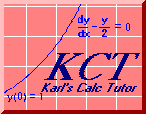

Greetings and welcome to Karl's Calculus Tutor, the place where top grades in elementary college math courses are reared. Is your calculus course at some big university run like a sausage factory? Are you bewildered by the stretch the material is demanding your mind to make? Have you lost confidence that you will ever be able to understand this stuff? Take heart. Although I have never been in your situation, I have rescued many from it, and I can rescue you as well.
Actually, you will rescue yourself. It can never be any other way with math. I can lead you to the land of understanding, but you will have to be the one to put one foot in front of the other and make the journey. But you are no dummy. You got into this university, didn't you? And anybody with enough smarts to do that can do calculus as well. Perhaps you don't believe me just yet. That's ok. Your mind is like a muscle. As you exercise the part of it that can do calculus, it will grow stronger. And as with any training program, the more you train, the more confident you will become.
Before we get started, allow me to disabuse you of any misconception you might have that you will be able to glide through by having me tell you what procedures to memorize. Math is not about memorization. Many people do arrive at marginally passing grades by memorizing procedures, but such people gain little or no knowledge from the experience. Math is about solving problems. It is about ideas and abstractions. It is about things making sense. Anybody can memorize the entire text of Hamlet and recite it back given enough time to study. But only an actor who understands the ideas that underlie the play will be able to stage a performance that is anything but agony for both the actor and his audience. And perhaps your math experience till now has been agony for both you and your teachers. It's time you changed that. When you do, you will no longer be stymied by a problem on the test that is not a near copy of something your teacher did on the board. If you learn the ideas, the procedures will seem obvious -- and not just the procedures you saw done in class. You will have the power to tailor the procedures so that you can bring them to bear on whatever variation of a problem the professor throws at you. Rather than just knowing how to grow a tomato, you will know how to grow a garden.
And one more thing on this topic. Memorizing is no fun. Ideas are. When you see the fun and beauty in it all, it will still be hard, but you will have found a motive for doing it beyond just getting a grade. Such a motive is the soil in which A's grow.
In many highschool math classes, along with beginning undergraduate classes, whenever the teacher says, "There will be proofs on the exam," a chorus of groans oozes from the class. Those groans are coming from the memorizers, because they know that memorization will not help them one whit if they are asked to prove something. You will know that your mind is whipping itself into shape when the idea of proving something is no longer painful to you -- just the way touching your toes ceases to be painful once you are in the habit of doing it each day.
This tutorial will provide links to proofs of most of the assertions I will be making in it. You will be wise to read and reread the proofs until you understand them (remember that you cannot read a math text the way you read a novel. In the words of Jaquelyn Susann, once is not enough). So when you see the blue text, be sure to click on it.
I will also be providing you with guided exercises in which you will solve a hard problem by answering a series of easy questions that I will pose to you. In some of those exercises, you will be formulating proofs. And please don't groan. Doing proofs is good for you. Proofs teach you to think. The skill you will acquire from doing them will enable you to think your way through other problems. And that will put you way out ahead of the memorizers.
Move on to Number Systems
email me at hahn@netsrq.com